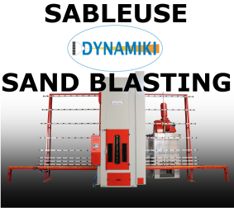FROG: A new system for glass inspection from Deltamax Automazione
When industrial innovation deals with glass crashing and quality control
Have you ever thought about how the glasses of your car would break in case of a strong collision? In many pieces of course, but how many? And how big? Indeed, the number and size of the glass fragments are very important as far as security is concerned.
We are talking about tempered glass, the glass undergoing a specific tempering process including heating and subsequent cooling. Such process renders the glass about four times stronger than "ordinary", or annealed glass. Unlike ordinary glass, which can shatter into jagged shards when broken, tempered glass breaks into small, relatively harmless pieces. This is why tempered glass is used in those environments where human safety is an issue. Applications include side and rear windows in vehicles, entrance doors, shower and tub enclosures, microwave ovens and skylights.
To check the size and the number of fragments in a given glass product in order for such product to meet quality control and security criteria: this is the need of specific glass manufacturing processes. And here’s the invention from Deltamax Automazione, a company from Trento with over twenty years experience in industrial automation and machine vision, and whose mission is to guide its customers in using innovative technologies in order to improve effectiveness and efficiency in production processes.
FROG (Fragment Recognizer On Glass), this is the name of the new system, is a rational and user friendly interface for automatic visual inspection of glass products.
But how does it work? Chiara Corridori, Deltamax Technical Manager explains: “FROG can automatically recognize, count, analyze and classify glass fragments following a glass product break. In addition, it can store the images and the results processed to generate customized reports”. She continues: “The main component of the FROG system is the inspection unit, connected to a PC and to the electrical cabinet: the user can move the system to the desired position and select the analysis functionality in the graphic user interface. At the end of the analysis, the system releases a report on the test results, including the image of the glass as acquired by the camera, the number of fragments identified and the size of the biggest fragments”.
“The advantages of an automatic system for counting fragments compared to a manual counting system”, continues Chiara Corridori, “are obvious: quicker and objective results, in accordance with identified standards, and possibility of data storing. Thanks to the use of direct light, FROG is extremely easy to manoeuvre and suitable to be used also with printed glass: two features that make it stand out from competitors using backlight illumination. In addition to the new use, the market appreciates the solution because of the convenient price and because it needs no installation”.
FROG stems from Risolvi, acronym of “RIcerca di SOLuzioni di Visione per applicazioni Industriali” (research of vision solutions for industrial applications), a research project funded by the Trento Province between 2011 and 2015, which has allowed to implement prototypes able to innovate GlassInspector, the system created by Deltamax using camera technology to recognize and catalogue defects, and to inspect glass sheets directly on the production line. The research project has been carried out in collaboration with the TeV group from the Fondazione Bruno Kessler (Fbk) research centre in Trento. The collaboration has been very successful as it involved the transfer of know-how on Image Processing algorithms as well as software System architecture. As a consequence, a scientist from Fbk is now employed by Deltamax.
Furthermore, together with Fbk, a new software architecture has been designed and implemented (DVS – Deltamax Vision System), which provides new applications with flexibility, expandability and ease in configuration.
This allows computer scientists to reduce developing time and the system installers to modify the parameters in order to adjust the system to a new need without modifying the code.
The artificial vision system, i.e. the use of cameras and optical sensors for the acquisition of images and for the automatic search of defects, derives from the so-called Machine Vision, a branch of Systems Engineering requiring different competences and relying on mechanical-optical-electronic-software systems integrated solution for examining natural objects and materials, human and industrial artifacts and manufacturing processes, in order to detect defects and improve quality, thus increasing efficiency and safety of both products and processes.
Recently, Deltamax invented an innovative solution for improving systems for defects identification and classification. For such systems, both the hardware (illuminator and electronic control cards) and algorithms have been developed. For example, starting from an algorithm conceived by researchers at the University of Munich for highlighting streets in satellite images, Deltamax has implemented a new algorithm able to identify scratches in flat glass surfaces images as if they were streets. Scratches and streets in fact share the same geometric characteristics: length, thinness, and curvilinearity.
Gianluca Diener, manager of Deltamax Inspection Technology area, concludes: “The impact our research has generated is tangible: over the last four years in the artificial vision area the 3 initial people that work on software development have now become 7, of whom one is the researcher collaborating to the Risolvi project. Moreover, the feedback from the market is positive and we already face an increase in our sales”.








